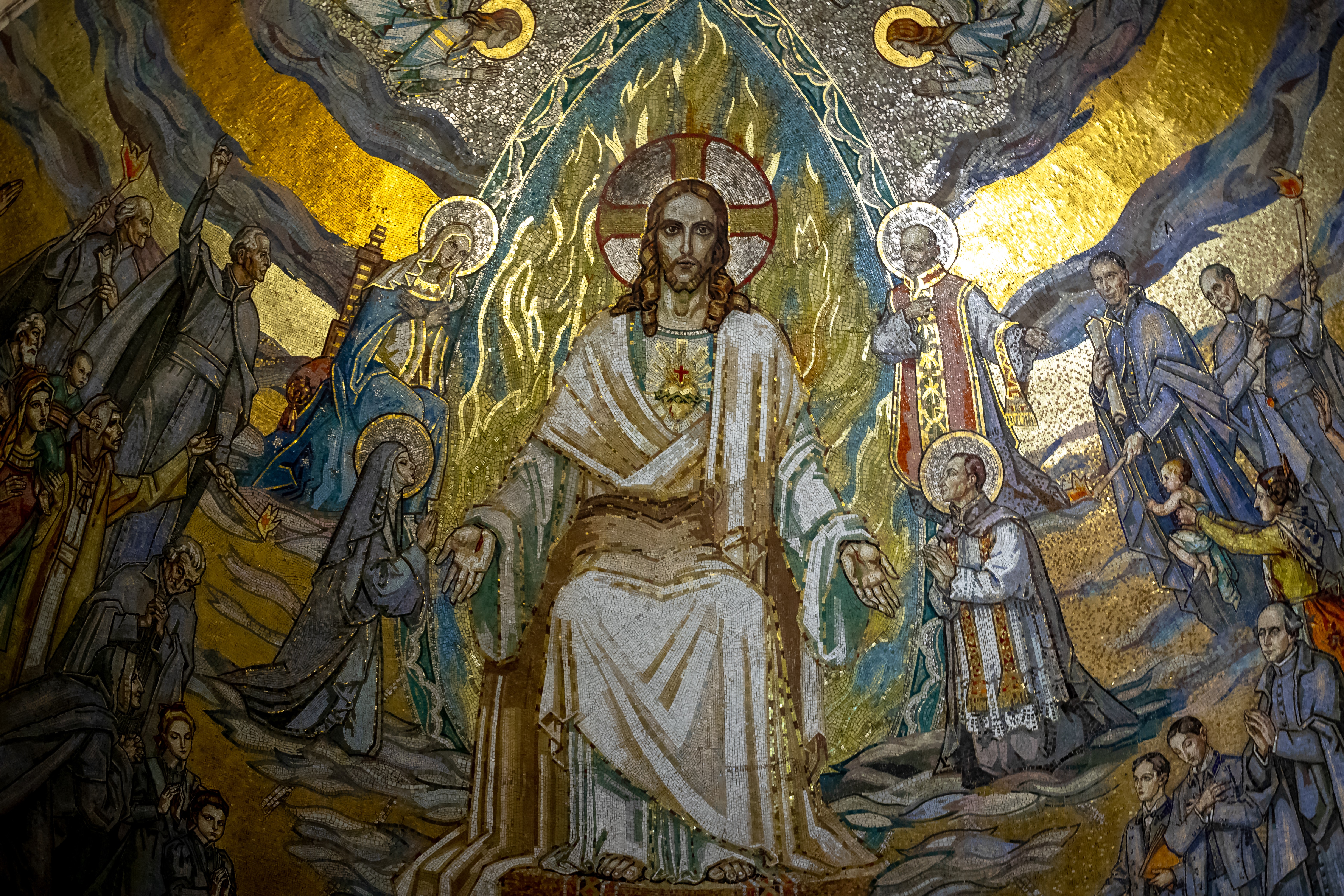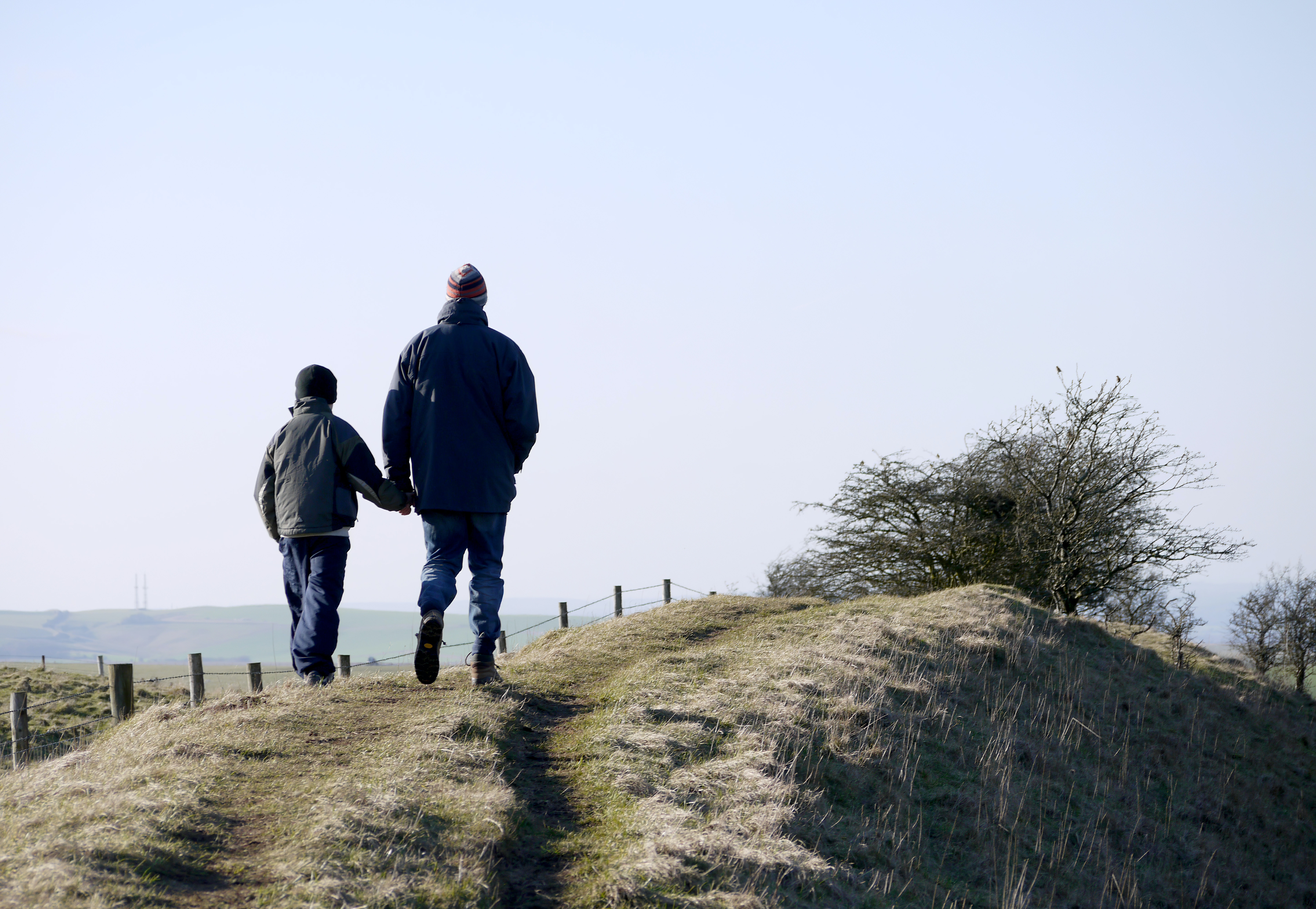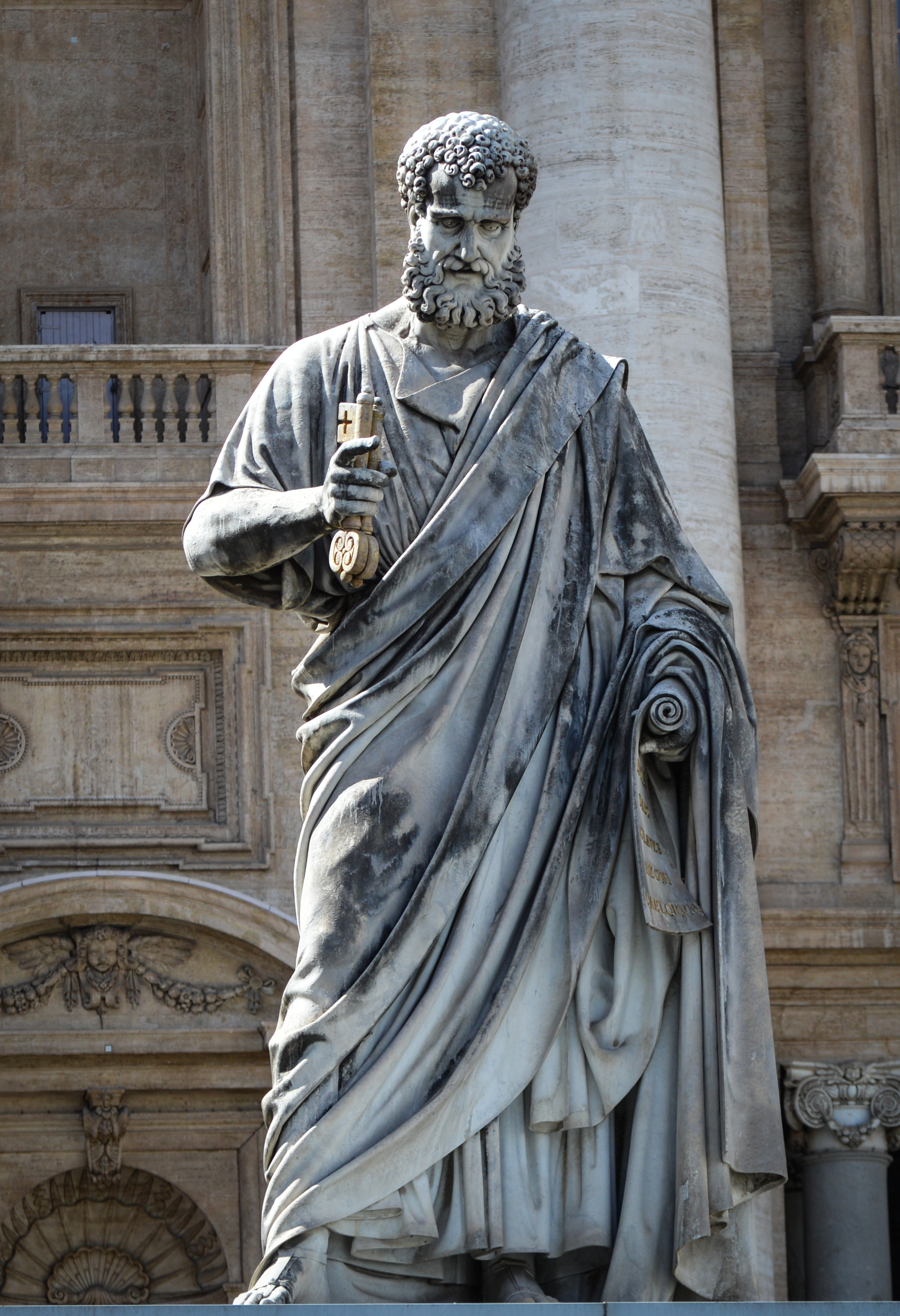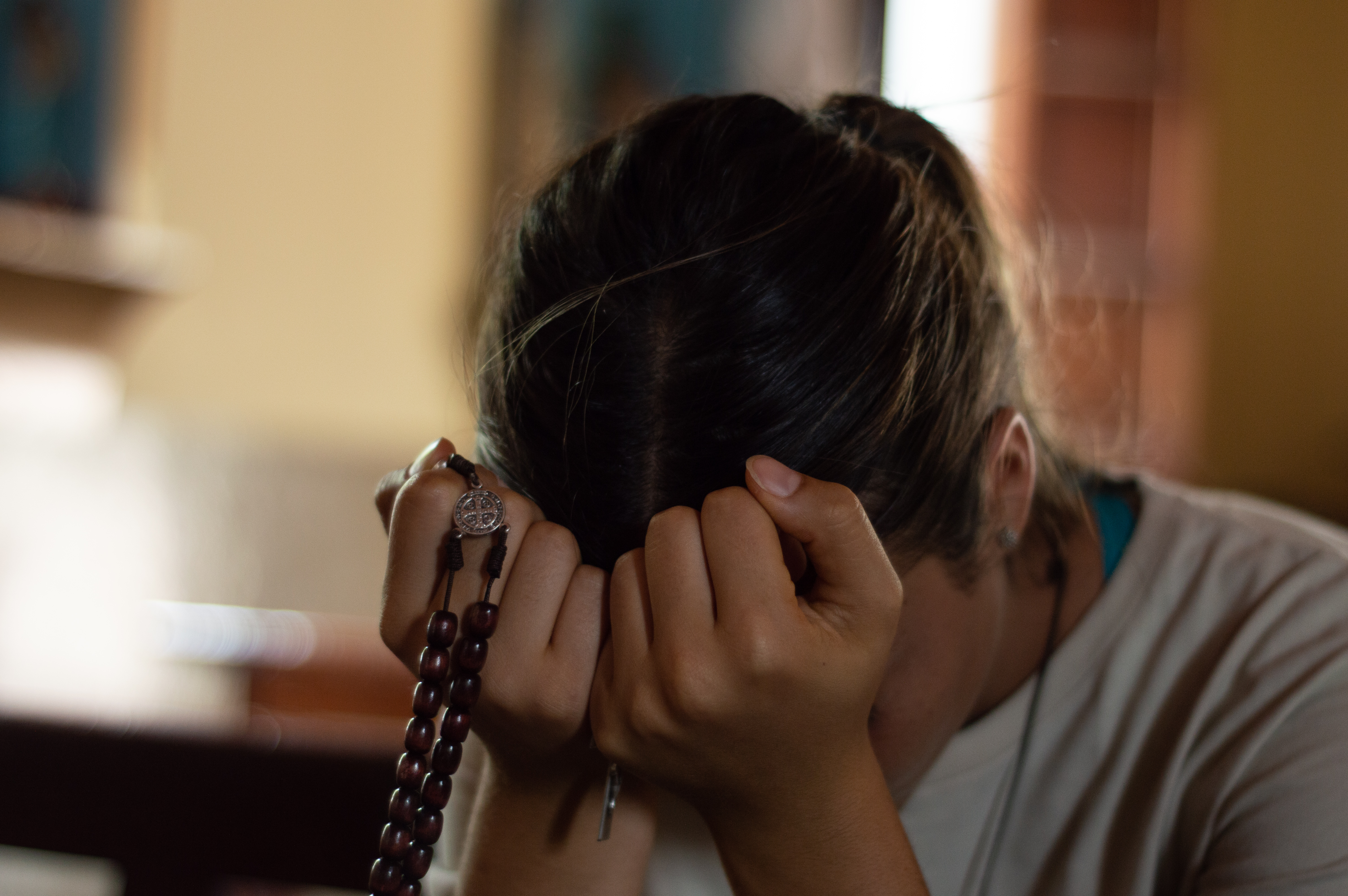When my son was a teenager, he had a sweatshirt that said, “Get holy or die tryin.'” On the back of the sweatshirt, it listed over 40 people, from St. Paul to St. Joan of Arc to Blessed Miguel Pro, all of whom died as a result of their efforts to live holy lives.
In today’s First Reading, God commands Moses to speak to the Israelite people on His behalf, “Be holy, for I, the LORD, your God, am holy.” In the Gospel reading for today, Jesus Himself says, “…be perfect, just as your heavenly Father is perfect.” This one concept summarizes who God is and what He invites us to be. As Catholics, we are called to spend our lives striving to be more like God until our earthly life ends, and when we have been made perfectly holy, to share in His divine life forever.
It all starts here, now, today. A life of holiness is not only meant for nuns and monks in the cloister. St. Therese of Lisieux said, “Perfection consists in doing His will, in being what He wills us to be.” Whatever state of life we are called to, whatever vocation, that is the vocation which will lead to our sanctification if we cooperate with God’s grace day-by-day.
Certainly, holiness involves an active prayer life and sacramental life, but it also means growth in virtue. The Catechism tells us that virtue is a habitual and firm disposition to do good. Love, prudence, justice, fortitude, self-control, humility, patience…there are so many beautiful virtues.
Like muscles, virtues are strengthened when they are put to use. It is all too easy to be a couch potato when it comes to our spiritual lives—we just sort of lounge around assuming growth in virtue will happen naturally. We fail to make a plan to exercise virtue, much less put that plan into practice.
If we want to be holy, we must make a real effort. A daily examination of conscience will help us identify the ways in which we sin. Then we can practice with energy and determination, the corresponding virtues, so that we eventually stop committing those habitual sins. Are we overly concerned about our own enjoyment? Spending a few hours helping an elderly neighbor will make us more generous. Are we embarrassed to be identified as Christian? Leading grace at a family get-together will strengthen us to be more courageous. Are we preoccupied about receiving praise from others? Choosing to assist a co-worker without looking for accolades will help us become less vain.
Blessed Henry Suso, echoing the sentiments of today’s Mass readings, said, “God has not called his servants to a mediocre, ordinary life, but rather to the perfection of a sublime holiness.” A life of virtue, which we see in the lives of the Saints, will not only bring love and healing to a broken world, but will ultimately lead to our own happiness. “With God’s help, [virtues] forge character and give facility in the practice of the good. The virtuous man is happy to practice them” (CCC 1810).
Cuando mi hijo era adolescente, tenía una sudadera que decía: “Sé santo o muérete intentándolo”. En la parte posterior de la sudadera, figuraba una lista de más de 40 personas como San Pablo, Santa Juana de Arco y el Beato Miguel Pro, quienes se murieron como resultado de sus esfuerzos por vivir vidas santas.
En la Primera Lectura de hoy, Dios ordena a Moisés que hable al pueblo de Israel en su nombre: “Sean santos, porque yo, el Señor, soy santo”. Luego en el Evangelio de hoy, Jesús mismo dice: “Ustedes, pues, sean perfectos, como su Padre celestial es perfecto”. Este concepto resume quién es Dios y lo que Él nos invita a ser. Como católicos, estamos llamados a pasar nuestras vidas esforzándonos por ser más como Dios hasta que termine nuestra vida terrenal, y cuando seamos perfectamente santos, a compartir su vida divina para siempre.
Todo comienza aquí, ahora, hoy. Una vida de santidad no es solo para monjas y monjes en el claustro. Santa Teresa de Lisieux dijo: “La perfección consiste en hacer Su voluntad, en ser lo que Él quiere que seamos”. Sea cual sea el estado de vida al que seamos llamados, sea cual sea la vocación, esa es la vocación que llevará a nuestra santificación si cooperamos con la gracia de Dios todos los días.
Ciertamente, la santidad implica una vida de oración activa y una vida sacramental, pero también significa crecer en la virtud. El Catecismo nos dice que la virtud es una disposición habitual y firme para hacer el bien. El amor, la prudencia, la justicia, la fortaleza, el autodominio, la humildad, la paciencia… hoy tantas virtudes tan hermosas.
Al igual que los músculos, las virtudes se fortalecen utilizándolas. Es muy fácil ser flojos cuando se trata de nuestra vida espiritual: estamos allí echados, tomando por hecho que el crecimiento en la virtud ocurra naturalmente. No hacemos un plan para ejercer la virtud, y mucho menos lo ponemos en práctica.
Si queremos ser santos, debemos hacer un esfuerzo verdadero. Un examen de conciencia diario nos ayuda identificar como solemos pecar. Luego podemos practicar las virtudes correspondientes con energía y determinación, para que eventualmente dejemos de cometer esos pecados habituales. ¿Estamos demasiado preocupados por el placer? Dedicar unas horas a ayudar a un vecino anciano nos hará más generosos. ¿Nos da vergüenza que nos identifiquen como cristianos? Rezar antes de comer en una reunión familiar nos fortalecerá para ser más valientes. ¿Estamos preocupados por recibir elogios? Elegir ayudar a un compañero de trabajo sin buscar elogios nos ayudará a ser menos vanidosos.
El Beato Enrique Suso, haciéndose eco de los sentimientos de las lecturas de la Misa de hoy, dijo: “Dios no ha llamado a sus siervos a una vida mediocre y ordinaria, sino a la perfección de una santidad sublime”. Una vida de virtud, que vemos en la vida de los santos, no solo traerá amor y sanación a un mundo quebrantado, sino que finalmente conducirá a nuestra propia felicidad. “Con la ayuda de Dios [las virtudes] forjan el carácter y dan soltura en la práctica del bien. El hombre virtuoso es feliz al practicarlas.” (CIC 1810).
 Christine Hanus currently lives in Upstate, NY. Though she enjoys writing and her work as a catechist, Christine is primarily a wife, mother, and more recently, grandmother!
Christine Hanus currently lives in Upstate, NY. Though she enjoys writing and her work as a catechist, Christine is primarily a wife, mother, and more recently, grandmother!
Feature Image Credit: Stephanie LeBlanc, unsplash.com/photos/z4LXu7NiII4


 Mike Karpus is a regular guy. He grew up in Michigan’s Upper Peninsula, graduated from Michigan State University and works as an editor. He is married to a Catholic school principal, raised two daughters who became Catholic school teachers at points in their careers, and now relishes his two grandchildren, including the older one who is fascinated with learning about his faith. He also has served on a Catholic school board, a pastoral council and a parish stewardship committee. He currently is a lector at Mass, a Knight of Columbus, Adult Faith Formation Committee member and a board member of the local Habitat for Humanity organization. But mostly he’s a regular guy.
Mike Karpus is a regular guy. He grew up in Michigan’s Upper Peninsula, graduated from Michigan State University and works as an editor. He is married to a Catholic school principal, raised two daughters who became Catholic school teachers at points in their careers, and now relishes his two grandchildren, including the older one who is fascinated with learning about his faith. He also has served on a Catholic school board, a pastoral council and a parish stewardship committee. He currently is a lector at Mass, a Knight of Columbus, Adult Faith Formation Committee member and a board member of the local Habitat for Humanity organization. But mostly he’s a regular guy.


 Dakota lives in Denver, CO with her husband, Ralph, and their two sons, Alfie & Theophilus. She is the Dean of Enrollment Management for Bishop Machebeuf High School where her husband also teaches. You can find Dakota at the zoo or a brewery with her family or with her nose in a book at home. For more of Dakota’s writing check out
Dakota lives in Denver, CO with her husband, Ralph, and their two sons, Alfie & Theophilus. She is the Dean of Enrollment Management for Bishop Machebeuf High School where her husband also teaches. You can find Dakota at the zoo or a brewery with her family or with her nose in a book at home. For more of Dakota’s writing check out 
 Kathryn Mulderink, MA, is married to Robert, Station Manager for Holy Family Radio. Together they have seven children (including Father Rob), and seven grandchildren. She is President of the local community of Secular Discalced Carmelites and has published five books and many articles. Over the last 30 years, she has worked as a teacher, headmistress, catechist, Pastoral Associate, and DRE, and as a writer and voice talent for Catholic Radio. Currently, she serves the Church by writing and speaking, and by collaborating with various parishes and to lead others to encounter Christ and engage their faith. Her website is
Kathryn Mulderink, MA, is married to Robert, Station Manager for Holy Family Radio. Together they have seven children (including Father Rob), and seven grandchildren. She is President of the local community of Secular Discalced Carmelites and has published five books and many articles. Over the last 30 years, she has worked as a teacher, headmistress, catechist, Pastoral Associate, and DRE, and as a writer and voice talent for Catholic Radio. Currently, she serves the Church by writing and speaking, and by collaborating with various parishes and to lead others to encounter Christ and engage their faith. Her website is 
 Kate Taliaferro is an Air Force wife and mother. She is blessed to be able to homeschool, bake bread and fold endless piles of laundry. When not planning a school day, writing a blog post or cooking pasta, Kate can be found curled up with a book or working with some kind of fiber craft. Kate blogs at
Kate Taliaferro is an Air Force wife and mother. She is blessed to be able to homeschool, bake bread and fold endless piles of laundry. When not planning a school day, writing a blog post or cooking pasta, Kate can be found curled up with a book or working with some kind of fiber craft. Kate blogs at 
 J.M. Pallas has had a lifelong love of Scriptures. When she is not busy with her vocation as a wife and mother to her “1 Samuel 1” son, or her vocation as a public health educator, you may find her at her parish women’s bible study, affectionately known as “The Bible Chicks.”
J.M. Pallas has had a lifelong love of Scriptures. When she is not busy with her vocation as a wife and mother to her “1 Samuel 1” son, or her vocation as a public health educator, you may find her at her parish women’s bible study, affectionately known as “The Bible Chicks.”
 Tami Urcia grew up in Western Michigan, a middle child in a large Catholic family. She spent early young adulthood as a missionary in Mexico, studying theology and philosophy, then worked and traveled extensively before finishing her Bachelor’s Degree in Western Kentucky. She loves tackling projects, finding fun ways to keep her little ones occupied, quiet conversation with the hubby and finding unique ways to love. She works at for Christian Healthcare Centers, is a guest blogger on
Tami Urcia grew up in Western Michigan, a middle child in a large Catholic family. She spent early young adulthood as a missionary in Mexico, studying theology and philosophy, then worked and traveled extensively before finishing her Bachelor’s Degree in Western Kentucky. She loves tackling projects, finding fun ways to keep her little ones occupied, quiet conversation with the hubby and finding unique ways to love. She works at for Christian Healthcare Centers, is a guest blogger on 
 David Dashiell is a freelance author and editor in Nashville, Tennessee. He has a master’s degree in theology from Franciscan University, and is the editor of the anthology
David Dashiell is a freelance author and editor in Nashville, Tennessee. He has a master’s degree in theology from Franciscan University, and is the editor of the anthology 

 Susan Ciancio has a BA in psychology and a BA in sociology from the University of Notre Dame, with an MA in liberal studies from Indiana University. For the past 19 years, she has worked as a professional editor and writer, editing both fiction and nonfiction books, magazine articles, blogs, educational lessons, professional materials and website content. Thirteen of those years have been in the pro-life sector. Currently Susan freelances and writes weekly for HLI, edits for American Life League, and is the executive editor of Celebrate Life Magazine. She also serves as executive editor for the Culture of Life Studies Program—an educational nonprofit program for K-12 students. You can reach her at
Susan Ciancio has a BA in psychology and a BA in sociology from the University of Notre Dame, with an MA in liberal studies from Indiana University. For the past 19 years, she has worked as a professional editor and writer, editing both fiction and nonfiction books, magazine articles, blogs, educational lessons, professional materials and website content. Thirteen of those years have been in the pro-life sector. Currently Susan freelances and writes weekly for HLI, edits for American Life League, and is the executive editor of Celebrate Life Magazine. She also serves as executive editor for the Culture of Life Studies Program—an educational nonprofit program for K-12 students. You can reach her at 
